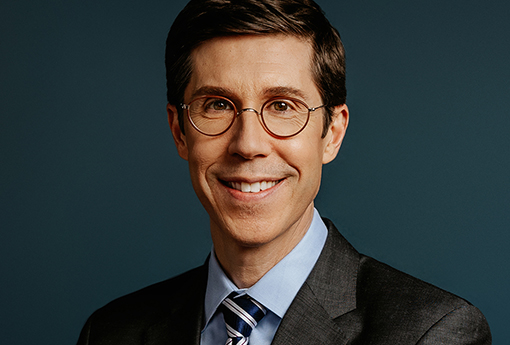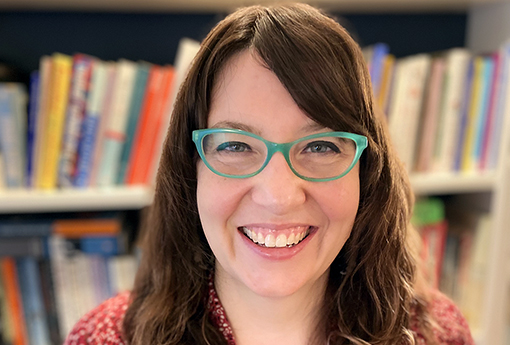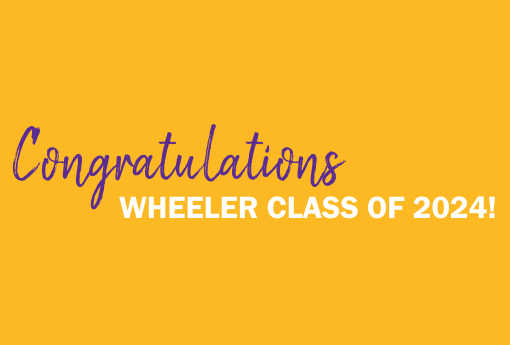
Mark Harris and Wheeler: Taking “A Great Leap Forward” Over 50 Years
August 25, 2021
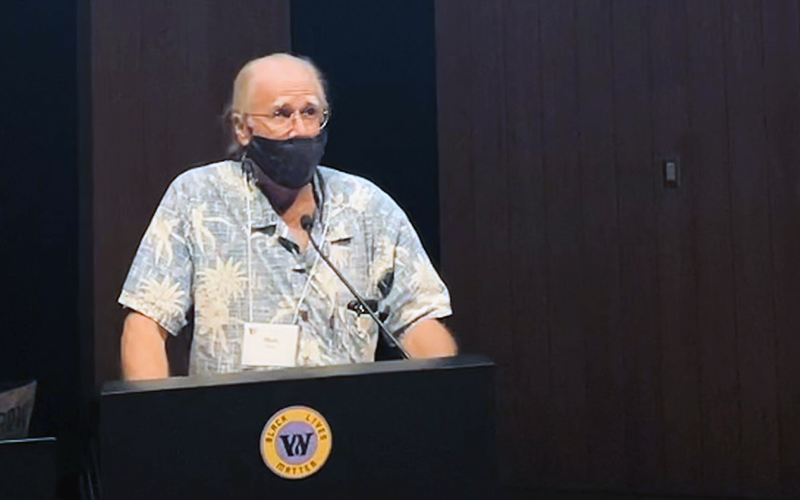
Mark Harris, the beloved and long-time director of Wheeler’s Aerie Enrichment program, energized the first all-school faculty and staff meeting of 2021-22, which will be his 50th year at Wheeler, with an enthusiastic speech reflecting on Wheeler’s growth over those five decades.
When Harris started at Wheeler, the school had boarding students and his initial role was as a dorm parent. “Things were quite different here,” he recalled. “Wheeler was all girls. Students wore uniforms. The entire Middle School fit in the spaces next to the painting studio atop Wheeler Hall. The little auditorium below was also the gym. The green room in the basement served as a dodgeball court on rainy days. The Fresh Air Building housed Grades 4 through 6. Boarders would sunbathe on the roof during free periods.
“Little did I know then that I had found a home,” Harris continued. “I umpired softball games and helped coach basketball. In the days before Title IX took full effect, Wheeler was a powerhouse in girls’ athletics. There were only a few sports, but the girls here had opportunities and excelled. I soon taught science in Lower School and PE to the little ones at Cushing. I also did some carpentry. I was hired to build magazine racks for the library, and when Lower School needed cubbies for the new classrooms in Angell, the Lower Scholl head and I made them on days off.”
In the 1970s, Wheeler transitioned into a coeducational day school. Harris moved to The Wheeler Farm and was a 6th-grade teacher. “The Farm then had just two playing fields, leased some pastures for hay, and had some overgrown orchards,” Harris told his colleagues. “A barn sheltered the Seekonk police chief’s horses, which meant that security out there was terrific. The evolution of Wheeler is especially striking visually out there today: spectacular new fields, pool, pavilion, field house, tennis courts, and ropes courses.”
Despite Wheeler’s modest resources earlier in his tenure, Harris said the school has always been about opportunity and investment. “Even then, there was a place for a dreamer with a lot to learn. There was room to develop ideas and make them work, to build and create. The capital hasn’t always been money. It’s often been time and energy. There were mentors to pick me up when I stumbled–colleagues who gave me reality checks. And always willing investors and co-conspirators. Best of all, great teachers to learn from.”
Harris collaborated with many of those teachers in a new role after the Aerie program became his full-time job in 1980 (more on that to come in later stories).
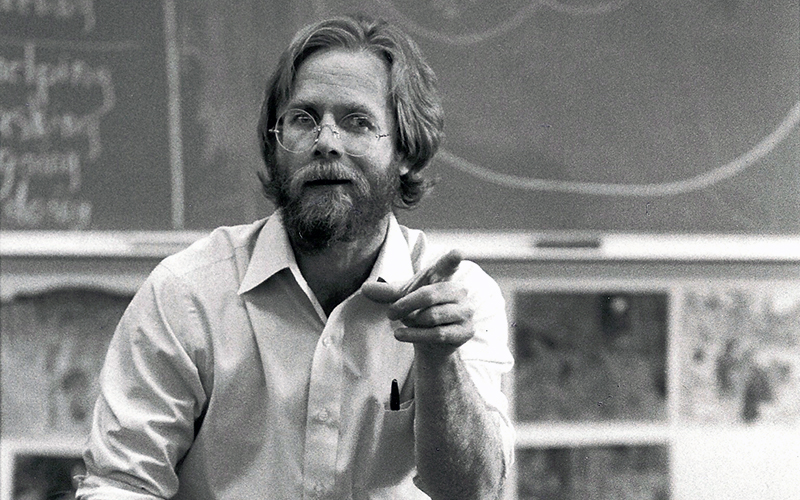
Fast-forwarding to the present and reflecting on the challenges of teaching and learning in a pandemic, Harris said that Wheeler would do more than “return to normal” this year as he and his fellow faculty and staff members embrace new possibilities they realized last year. “We’ll bring lessons learned with us. I’d have teachers literally around the world keep working with our kids. Arabic teachers in Israel, Computer Science instructors in Colorado, writing mentors in Michigan.
“What becomes clear to us when we arrive every September, for the first time or the thirtieth, is that we are each year renewed,” he continued. “And in very short order, we all have the chance to create lasting impact—every day. We are professional difference-makers. And this community actually puts at our disposal dream makers! Imagine, people actually have jobs here, to make our dreams come true! Need a radio tower? Need a pavilion for a 6th-Grade Farm Program? Need a classroom at the Waterfire Arts Center? A teacher-designed science lab? Someone to install shelves or fix the air conditioning? Get you 10 electric keyboards? The Maintenance crew, Business office, Advancement, and Head of School’s office. These are our facilitators, who give us the tools we need to do great things.
“For as long as I’ve been here there have been supporters of innovation, intrepid adventurers, investors in cutting edge pedagogy. Innovations like: The Hamilton program and dance. Molecular Biology. Neuroscience. Chinese. The Nest. Broadcasting. Jazz. Environmental Science for all. Resources for children to explore German and Astronomy and health care and brain waves. This is a place of breathtaking change but with a healthy respect for tradition and the tried and true.
“We’ve gone from ‘quirky’ to ‘great’ in five decades. We have come so far. We are so much better at teaching, at understanding how kids learn. This is a place where we can pool our individual talents and ambitions into a collective mission. We can partner with incredibly talented colleagues who embrace meeting our shared challenges. Each year, for each of us, is a chance for a great leap forward. A chance to build a legacy.
“I can honestly say I’ve never felt in any September that I’d be doing the same old thing for the umpteenth time. But I’m particularly excited now, as we leave behind the hardest year ever. There are bumps in the landscape, to be sure, but we can see a horizon, as clear and sharp as ever. In this school we have collaborators for hatching grand dreams and bringing them to life. But we also have tremendous autonomy, a chance to make our mark, to make a difference. And when you someday teach children of the children you once taught, you can see the difference you’ve made. I assure you—our impact lasts. Let’s go!”
